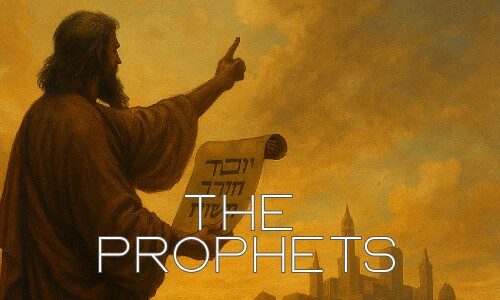This course examines the prophetic books of the Old Testament. It covers the historical context of the prophets, their role in ancient Israel, and the major themes of their messages, such as social justice, covenant fidelity, and future hope.
The Prophets
Level: Master’s
Course Length: 10 weeks (approx. 120–150 hours total if following full module path)
Delivery Mode: Competency-based, self-paced with required final exam
Course Overview
This course offers an in-depth study of the prophetic books of the Old Testament. Students will examine the historical role of prophets in Israel, the political and social circumstances in which they ministered, and the enduring theological themes of their messages. Key emphases include social justice, covenant faithfulness, judgment, restoration, and eschatological hope.
The course is competency-based:
-
Students may complete all modules and lesson plans to prepare for the final exam, or
-
If they already have the knowledge, they may skip directly to the final competency exam.
Competency is demonstrated through mastery of the prophets’ historical background, message, and theological contributions.
Learning Outcomes
By the end of this course, students will be able to:
-
Identify the historical and cultural settings of the prophetic books.
-
Explain the role of prophets as covenant messengers and social critics.
-
Distinguish the major themes of the former prophets (narrative books) and the latter prophets (writing prophets).
-
Interpret representative prophetic texts in light of their literary forms and theological messages.
-
Integrate prophetic themes into the broader story of Scripture.
Weekly Breakdown (10 Weeks)
Week 1: Introduction to Prophecy (8–10 hours)
-
Definition and function of prophets in Israel.
-
The office of the prophet vs. pagan divination.
-
Prophetic literature: former vs. latter prophets.
-
Competency: Describe the role and purpose of biblical prophets.
Week 2: Historical Context of the Prophets (12–14 hours)
-
Israel’s monarchy and divided kingdom.
-
Assyrian, Babylonian, and Persian contexts.
-
Competency: Explain how historical crises shaped prophetic messages.
Week 3: Major Prophet – Isaiah (Part 1) (12–14 hours)
-
Historical setting: 8th-century Judah.
-
Themes of holiness, judgment, and hope.
-
Competency: Analyze Isaiah’s early prophetic messages.
Week 4: Major Prophet – Isaiah (Part 2) (10–12 hours)
-
The servant songs.
-
Future hope and eschatology.
-
Competency: Explain Isaiah’s vision of salvation and restoration.
Week 5: Jeremiah and Lamentations (12–14 hours)
-
Historical background: final years of Judah.
-
Themes: covenant renewal, suffering, new covenant.
-
Competency: Interpret Jeremiah’s theology of judgment and hope.
Week 6: Ezekiel (12–14 hours)
-
Prophet in exile.
-
Themes: God’s glory, new heart and spirit, restoration of Israel.
-
Competency: Summarize Ezekiel’s vision of hope and renewal.
Week 7: The Twelve (Minor Prophets, Part 1) (10–12 hours)
-
Survey of The Twelve Minor Prophets
-
Hosea: covenant as marriage.
-
Amos: social justice and divine judgment.
-
Micah: true worship and hope.
-
Competency: Explain themes of early minor prophets.
Week 8: The Twelve (Minor Prophets, Part 2) (12–14 hours)
-
Nahum, Habakkuk, Zephaniah: judgment and faith.
-
Haggai, Zechariah, Malachi: post-exilic prophecy, restoration, and eschatology.
-
Competency: Distinguish themes of later minor prophets.
Week 9: Literary Forms & Themes in Prophecy (10–12 hours)
-
Oracles of judgment, oracles of salvation.
-
Symbolic actions, visions, and poetry.
-
Competency: Recognize and interpret prophetic literary forms.
Week 10: Integration & Competency Exam Prep (10–12 hours)
-
Overarching themes: justice, covenant fidelity, future hope.
-
Prophets in New Testament perspective.
-
Practice exam with selected passages.
-
Final Competency Exam (required).
Assessment
-
Competency Exam (100%): Students must demonstrate mastery of prophetic literature through interpretation of key texts, contextual analysis, and thematic synthesis.
-
Optional formative assessments: reading reflections, quizzes, and practice analyses (not required).
Curriculum
- 10 Sections
- 24 Lessons
- Lifetime
- Week 1: Introduction to Prophecy (8–10 hours)Definition and function of prophets in Israel. The office of the prophet vs. pagan divination. Prophetic literature: former vs. latter prophets.4
- Week 2: Historical Context of the Prophets (12–14 hours)Israel’s monarchy and divided kingdom. Assyrian, Babylonian, and Persian contexts.3
- Week 3: Major Prophet – Isaiah (Part 1) (12–14 hours)Historical setting: 8th-century Judah. Themes of holiness, judgment, and hope.3
- Week 4: Major Prophet – Isaiah (Part 2) (10–12 hours)The servant songs. Future hope and eschatology.3
- Week 5: Jeremiah and Lamentations (12–14 hours)Historical background: final years of Judah. Themes: covenant renewal, suffering, new covenant.3
- Week 6: Ezekiel (12–14 hours)Prophet in exile. Themes: God’s glory, new heart and spirit, restoration of Israel.3
- Week 7: The Twelve (Minor Prophets, Part 1) (10–12 hours)Survey of The Twelve Minor Prophets Hosea: covenant as marriage. Amos: social justice and divine judgment. Micah: true worship and hope.5
- Week 8: The Twelve (Minor Prophets, Part 2) (12–14 hours)Nahum, Habakkuk, Zephaniah: judgment and faith. Haggai, Zechariah, Malachi: post-exilic prophecy, restoration, and eschatology.3
- Week 9: Literary Forms & Themes in Prophecy (10–12 hours)Oracles of judgment, oracles of salvation. Symbolic actions, visions, and poetry.3
- Week 10: Integration & Competency Exam Prep (10–12 hours)Overarching themes: justice, covenant fidelity, future hope. Prophets in New Testament perspective. Practice exam with selected passages.4
Instructor

